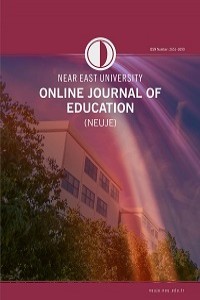TEACHER'S OPINIONS ON THE EDUCATION OF INCLUSIVE STUDENTS
TEACHER'S OPINIONS ON THE EDUCATION OF INCLUSIVE STUDENTS
___
- Akçamete, G., (2009). Inclusion model development project for students with special needs. Ankara: Ankara University Scientific Research Projects.
- Avcıoğlu, H., Eldeniz Çetin, M., & Özbey, F. (2005). Examining the attitudes of class and branch teachers who have inclusion students in their class towards inclusion. Reflections from special education (p. 79-89). Ankara: Kök Publishing.
- Babaoğlan, E., & Yılmaz, Ş., (2010). Classroom teachers' competencies in inclusive education. Kastamonu Journal of Education, 8(2), 345-354.
- Batu, S., & Kırcaali-İftar, G. (2007). Inclusion. Ankara: KÖK Publishing.
- Bilen, E. (2007). Opinions of primary school teachers about the problems they encounter in inclusion practices and suggestions for solutions (Unpublished master's thesis) Dokuz Eylül University, Institute of Educational Sciences, Department of Classroom Teaching, Izmir.
- Budak, Y. (1999). Total quality management in education and the importance of in-service training for teachers in the realization of an effective school. Journal of Contemporary Education, 251, 68-83.
- Diken, I. H. (2007). Cooperation in mainstreaming practices. Eskisehir: Anadolu University Press.
- Friend, M., & Bursuck, W. (2006). Including students with special needs a practical guide for classroom teachers (4th Edition b.). Boston: Allyn and Bacon.
- Friend, M., & Cook, L. (2000). Interactions: Collaboration skills for school professionals (7th. ed.). Boston, MA: Pearson.
- Fuchs, W. W. (2009-2010). Examining teachers' perception barriers associated with inclusion. SRATE Journal Winter, 19(1), 30-35.
- Güven, D., & Gürsel, O. (2010). Teachers' views on the evaluation of the achievement of students with intellectual disabilities participating in primary education inclusion practices. Paper Presented at the 20th National Special Education Congress, Gaziantep.
- Güzel Özmen, R. (2009). Instructional arrangements in inclusive environments. Ankara: Gündüz Education and Publishing.
- Horne, P., & Timmons, V. (2009). Making it work: Teachers' perspectives on inclusion. International Journal of Inclusive Education, 13(3), 273-286.
- Kuyini, A. B. & Mangope, B. (2011). Student teachers' attitudes and concerns about inclusive, education in Ghana and Botswana. International Journal of Whole Schooling, 7(1), 20-37.
- Kwapy, J. E. (2004). Attitudes toward inclusive education by K-12 regular and special education techers (Unpublished doctorate thesis). Capella University, Minneapolis, USA.
- McLeskey, J., Waldron, N. L., So, T. S. H., Swanson, K., & Loveland, T. (2001). Perspectives of teachers toward inclusive school programs. Teacher Education and Special Education, 24(2), 108-115.
- Metin, N., & Çakmak Güleç, H. (1998). The opinions of teachers in primary schools about the programs in which disabled children and normal children are integrated. 8th National Special Education Congress. Edirne.
- Metin, N., Güleç, H., & Şahin, Ç. (2009). Determination of primary school teachers' competencies after in-service training for the integration of mentally handicapped children. I. International Turkey Educational Research Congress, Çanakkale.
- Nizamoğlu, N. (2006). Classroom teachers' competencies in inclusion practices (Unpublished master's thesis). Abant İzzet Baysal University, Institute of Social Sciences, Department of Primary Education, Classroom Teaching Program, Bolu.
- Olçay-Gül, S., & Vuran, S. (2015). Opinions of students with special needs who attend regular classes and the problems they encounter. Education and Science, 169-195.
- Önder, M. (2007). Determination of instructional adaptations made by classroom teachers for inclusive students with intellectual disabilities (Unpublished Master's Thesis). Abant İzzet Baysal University, Bolu.
- Russell, M., Hoffmann, T., & Higgins, J. (2009). NimbleTools: A universally designed test delivery system. Teaching Exceptional Children, 42(2), 6-12. .
- Sucuoğlu, B., & Kargın, T. (2008). Inclusion practices in primary education, approaches, methods, techniques. Istanbul: Morpa Publications.
- Vuran, S, & Sarpdağ, D. (2001). Evaluation of the legal arrangements made in recent years regarding the disabled in terms of education services. X. National Special Education Congress Proceedings. Antioch.
- ISSN: 2651-3099
- Başlangıç: 2018
- Yayıncı: Yakın Doğu Üniversitesi
CONTENT ANALYSIS OF CURRICULUM DEVELOPMENT RELATED STUDIES DURING: 2000 – 2019
THE VIEWS OF ADMINISTRATORS’ REGARDING THE USE OF TECHNOLOGY IN EDUCATION
Fatma KÖPRÜLÜ, Roland Ndukong TANGİRİ
TEACHER'S OPINIONS ON THE EDUCATION OF INCLUSIVE STUDENTS
Mukaddes SAKALLI DEMİROK, Türkan GÖKALP
Roland NDUKONG TANGİRİ, Sanaria ABDULRAHMAN SADEEQ, Başak TİMUR DEMİRAL, Fatma MİRALAY
GAMIFICATION IN COMPUTER SCIENCE COURSES: A LITERATURE REVIEW
Fezile ÖZDAMLI, Dlgash Faran YAZDEEN
Şengül TÜMKAN, Mustafa ERİÇ, Fahri TÜMKAN
THE PSYCHOLOGY OF TEACHERS AND STUDENTS DURING THE PANDEMIC PROCESS AND THE WAYS TO COPE WITH STRESS
EVALUATION OF THE TEACHING TECHNIQUES OF THE PIANO ARRANGEMENT OF AL YEMENI MOR YEMENI SONG
